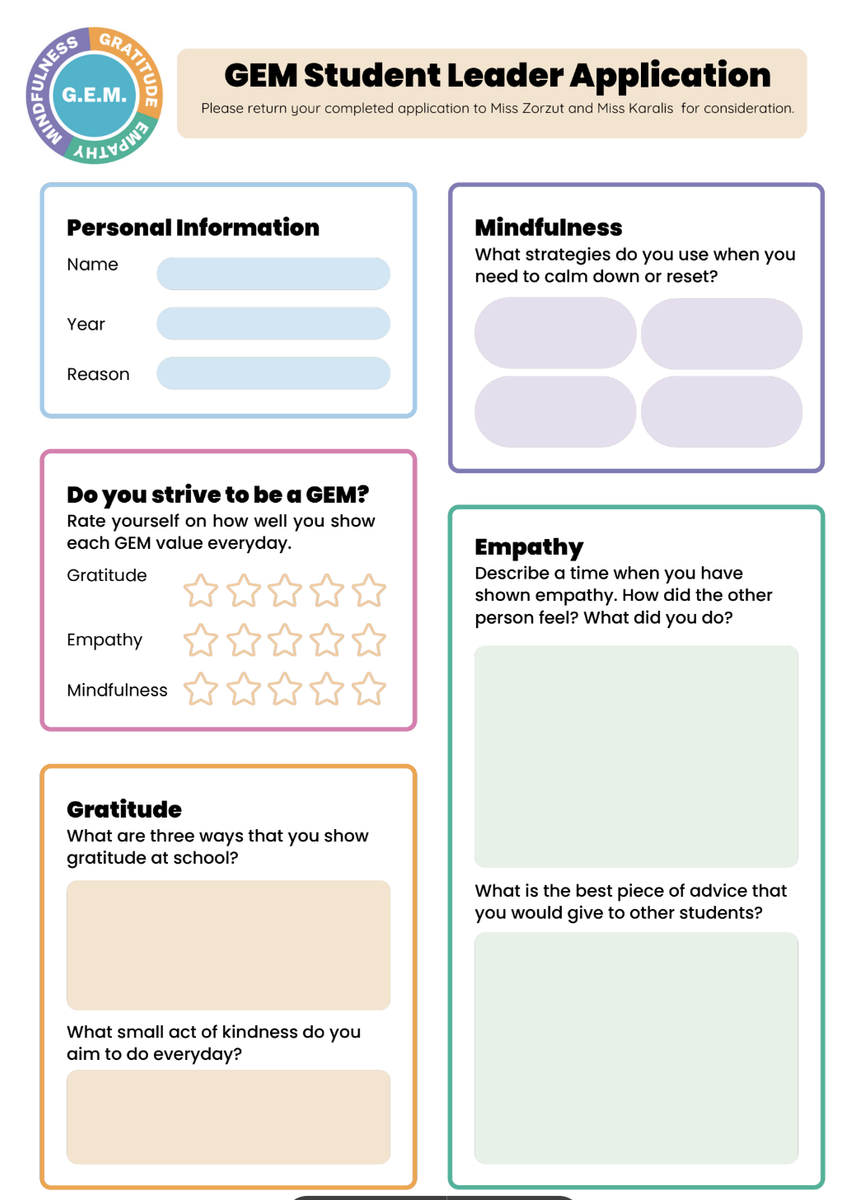Student Engagement
Bianka, Vicky & Vira

Student Engagement
Bianka, Vicky & Vira
A big welcome back to our wonderful community. We hope you all enjoyed the holiday break and had a lovely Easter. As we continue to integrate The Resilience Project into our pedagogy at St Fidelis, we have explored new ways to do so in a meaningful way. As such, this year we will be transitioning from SRC Leaders to GEM Leaders.
What are GEM Leaders?
GEM stands for Gratitude, Empathy and Mindfulness. GEM Leaders will support the Wellbeing Leaders (Ms Vicky Karalis and Ms Bianka Zorzut) in whole-school events, such as our GEM Day, GEM Assemblies, GEM Certificates, and help host GEM chats. They will also participate in meetings with the Wellbeing Leaders to help further our school's Wellbeing Program.


How will GEM Leaders be chosen?
Students will complete an application form reflecting on how they have demonstrated the pillars of TRP throughout their time at school. These applications will be reviewed by the Wellbeing Leaders, along with Mrs Watson and Ms Pirrotta, using a rubric to ensure a fair and equitable selection process for leadership roles.
When will this occur?
This will occur over the following two weeks. Each child in every class will be provided the opportunity to apply for this role during class time, if they wish.
Which students will be involved?
Years 2-6 Students will be invited to apply for the GEM Leadership Role. We value the voice of every student at St Fidelis, and we will encourage and provide all children with the opportunity to contribute to our school community.
This marks an important new step in embedding The Resilience Project (TRP) meaningfully at St Fidelis by fostering leadership grounded in gratitude, empathy, and mindfulness. We are not just supporting individual wellbeing; we are creating a culture where every student feels seen, heard, and valued. When student leaders model these values, they inspire a ripple effect, encouraging their peers to lead with compassion and build an inclusive, emotionally safe school community.
This will only be for years 2-6 this year, to allow for Foundation and Year 1 students to have time to settle into school life and focus on developing important skills such as confidence, communication, and social interaction. By the time they reach Year Two, students are more prepared to take on the responsibilities of leadership and to represent their peers in a meaningful way.
We invite and value the support and understanding of our parent community as we take this important step, recognising that nurturing emotional wellbeing and compassionate leadership is essential to helping our students thrive.
Please note this is our first year trialing the new leadership role, which will continue to evolve and develop according to the school's needs and feedback provided.
We will invite the families of the GEM Leaders to a special school assembly to present them with their badges in due course.
We hope you have a wonderful week ahead!
Vicky Karalis and Bianka Zorzut
Wellbeing Leaders
At St. Fidelis, we are currently preparing for the 2025 NCCD.
What is the NCCD?
The NCCD collects information about students with a disability who receive extra support at school. This support helps students access and participate in learning just like their classmates. Teachers make decisions about the support needed by working with parents, carers, and the student. Every year, schools are required to report this information to the Australian Government.
Why is the NCCD important?
The NCCD helps schools and governments better understand how to support students with disability. It also helps with planning and funding to ensure students get the help they need.
How is the information used?
How does the NCCD help our school? The NCCD helps us:
As part of this process, we are meeting with parents in support groups to review and plan the help students need. This information will be included in our NCCD report in August 2025.
For more information, please see the attached PDFs.
What is the NCCD? (PDF)